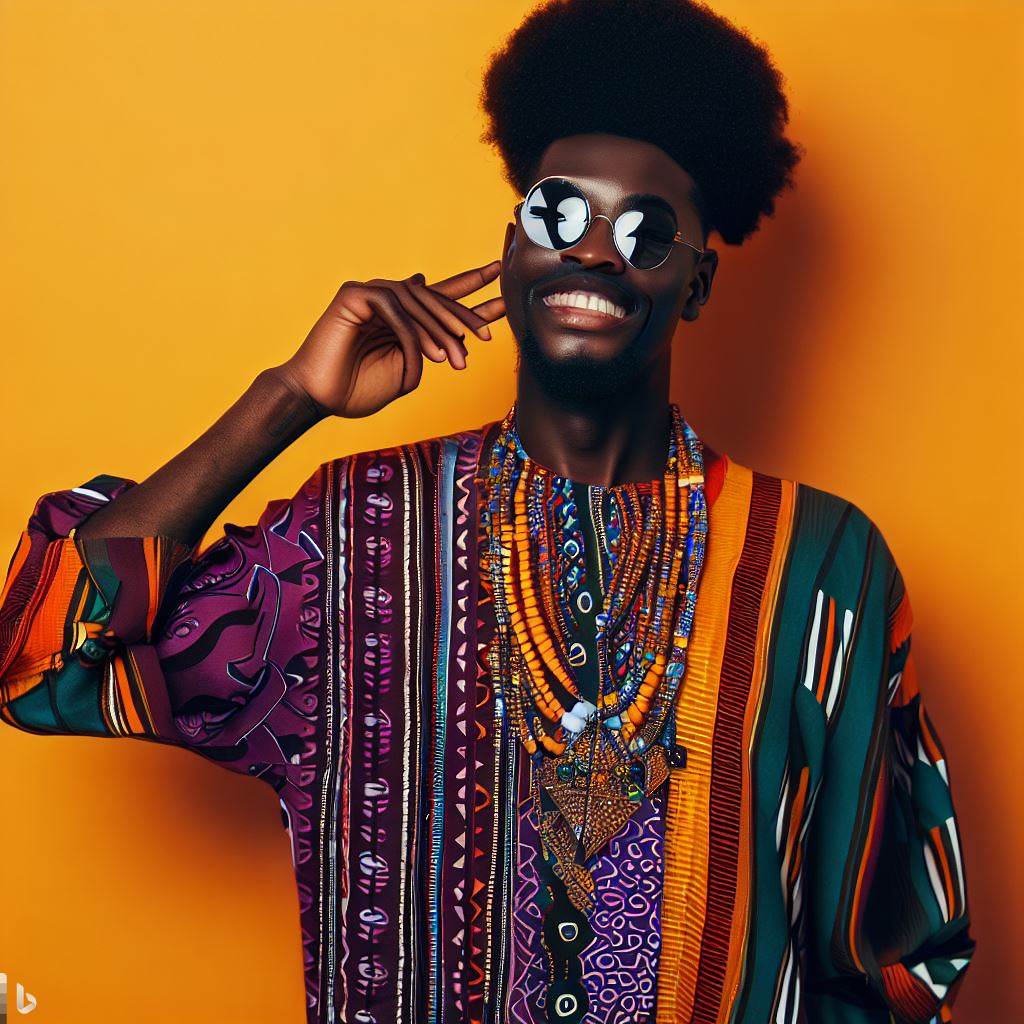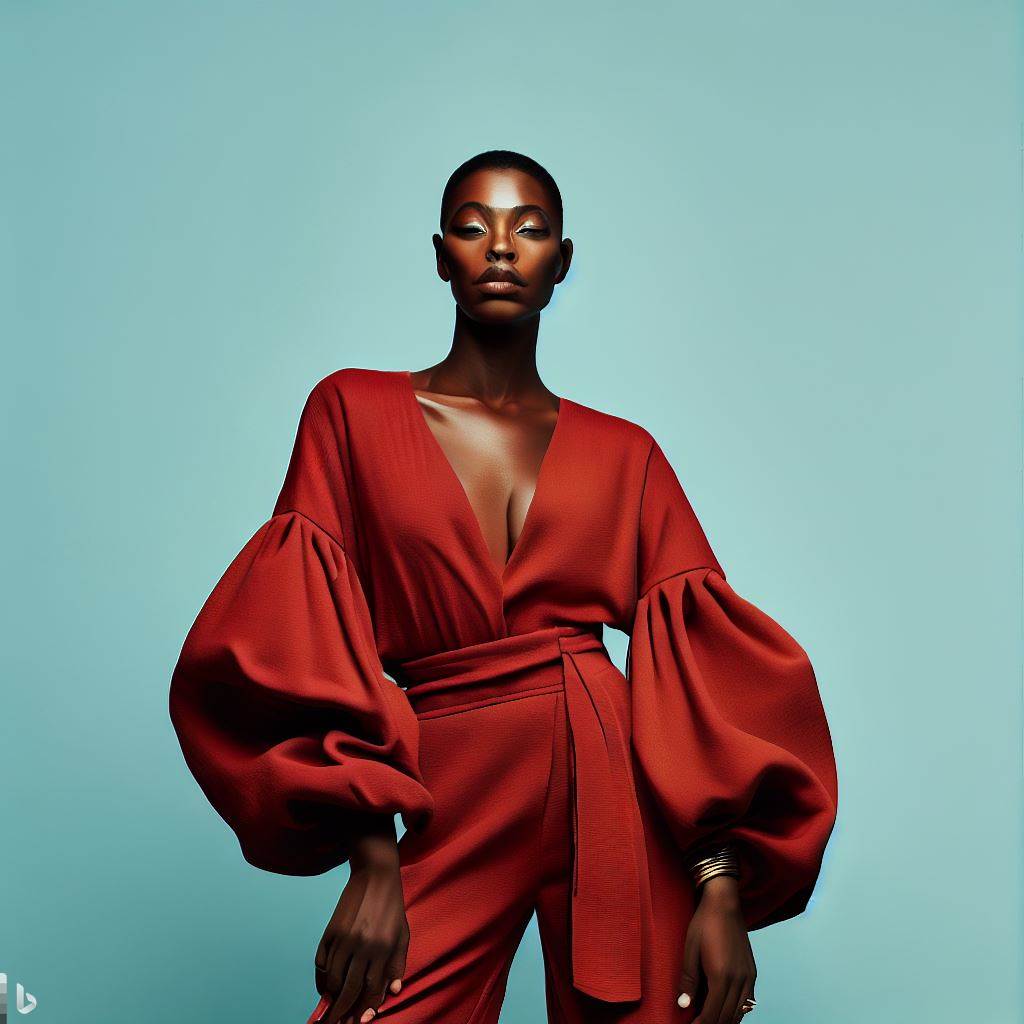Introduction
Let’s explore the international trends influence on Nigerian design.
In today’s interconnected world, the influence of international trends on various aspects, including design, cannot be undermined.
The Nigerian design industry, like many others, has not been immune to this impact.
This section will explore the importance of international trends in design and provide an overview of the Nigerian design industry.
Importance of international trends in design
International trends in design serve as a source of inspiration, creativity, and innovation.
They provide fresh perspectives and ideas that shape the evolution of design practices worldwide. Nigerian designers often look to these trends to stay relevant, meet consumer preferences, and compete on a global scale.
By embracing international trends, Nigerian designers can enhance their craftsmanship and expand their market reach.
Overview of Nigerian design industry
The Nigerian design industry is a vibrant and dynamic space. It draws inspiration from the country’s rich cultural heritage, diverse ethnic groups, and artistic traditions.
Nigerian designers excel in various fields, including fashion, interior design, graphic design, and product design.
They combine traditional African aesthetics with contemporary influences to create unique and captivating designs.
The industry also contributes significantly to the country’s economy, providing employment opportunities and promoting cultural exchange.
International trends have a significant impact on Nigerian design, providing designers with fresh ideas and helping them gain global recognition.
The Nigerian design industry, with its blend of local and global influences, showcases the country’s creativity and contributes to its cultural and economic growth.
Nigerian Design Influenced by Global Fashion Trends
Adoption of Western fashion trends
- Nigerian fashion industry has experienced a significant adoption of Western fashion trends.
- The Nigerian youth have embraced Western clothing styles, such as jeans, t-shirts, and sneakers.
- Western influences on Nigerian fashion can be seen in the way men and women dress.
- Traditional Nigerian clothing styles have also been modified to incorporate Western elements.
- Designers now create fusion designs that merge Nigerian and Western fashion aesthetics.
Influence of global runways on Nigerian designers
- Nigerian designers are increasingly looking to global fashion runways for inspiration.
- They attend fashion weeks in major cities like London, Paris, and New York to observe international trends.
- Global runways influence Nigerian designers in terms of silhouette, color palettes, and fabric choices.
- Nigerian designers incorporate global fashion trends into their collections to stay relevant in the industry.
- The influence of global runways has helped Nigerian designers gain recognition on the international stage.
Impact of social media platforms on international fashion trends
- Social media platforms like Instagram, Twitter, and TikTok have played a significant role in spreading international fashion trends.
- Nigerians, especially the younger generation, follow fashion influencers and celebrities on these platforms.
- International fashion trends are shared and replicated by Nigerian fashion enthusiasts on social media.
- Social media has made it easier for Nigerians to keep up with international fashion trends in real-time.
- Nigerian designers use social media to showcase their creations and attract a global audience.
Therefore, Nigerian design has been greatly influenced by global fashion trends.
The adoption of Western fashion trends by the Nigerian youth, the influence of global runways on Nigerian designers, and the impact of social media platforms have all contributed to the convergence of Nigerian and international fashion styles.
As the Nigerian fashion industry continues to grow, it is crucial for designers to stay informed about international trends while maintaining a unique Nigerian identity in their designs.
Read: How to Become a Cruise Ship Entertainer in Nigeria
Nigerian Design Incorporating Traditional Elements
Preservation of Nigerian cultural heritage in design
- Nigerian designers play a crucial role in preserving the rich cultural heritage of their country.
- They incorporate elements such as indigenous motifs, symbols, and traditional craftsmanship into their designs.
- By doing so, they promote and celebrate the unique Nigerian identity and heritage.
- Nigerian design showcases the diversity and creativity of traditional Nigerian cultures.
- It helps to pass down traditional knowledge and skills to future generations.
Reinterpretation of traditional fabrics and techniques
- Nigerian designers are known for their ability to reinterpret traditional fabrics and techniques.
- They infuse modern designs with traditional Nigerian textiles like Ankara, Adire, and Aso Oke.
- This fusion creates a unique blend of traditional and contemporary elements in Nigerian fashion.
- Designers experiment with innovative ways to incorporate traditional fabrics into clothing, accessories, and home decor.
- The reinterpretation of traditional techniques ensures that these art forms remain relevant in today’s globalized world.
Combination of traditional and modern aesthetics in Nigerian design
- Nigerian designers have embraced the fusion of traditional and modern aesthetics in their work.
- They combine indigenous elements with contemporary design principles to create a distinct style.
- This blend of old and new creates visually striking and culturally significant designs.
- The combination of traditional and modern aesthetics reflects Nigeria’s position as a multicultural and dynamic society.
- Nigerian design serves as a bridge between the past, present, and future, blending tradition with innovation.
In general, Nigerian design incorporates traditional elements in various ways, ensuring the preservation of Nigerian cultural heritage.
Designers play a significant role in showcasing and celebrating the diversity, creativity, and craftsmanship of traditional Nigerian cultures.
Through the reinterpretation of traditional fabrics and techniques, they infuse modern designs with the richness of Nigerian heritage.
This combination of traditional and modern aesthetics creates a distinct style that reflects Nigeria’s multicultural identity.
Overall, Nigerian design serves as a powerful tool for promoting and preserving the unique cultural heritage of Nigeria.
Read: Writing for Social Change: The Nigerian Experience
Nigerian Design Reflecting Global Sustainability Movement
Integration of eco-friendly materials in Nigerian design
- Eco-friendly materials like organic cotton and bamboo are being embraced by Nigerian designers.
- These materials help reduce the environmental impact of the fashion industry.
- Nigerian designers are incorporating sustainable materials into their designs, promoting a more eco-conscious approach.
- By using eco-friendly materials, Nigerian designers are contributing to the global sustainability movement.
- They are setting an example for the industry and encouraging others to follow suit.
Promotion of ethical fashion practices in the industry
- Nigerian design industry is embracing ethical fashion practices.
- Designers are ensuring fair labor practices and safe working conditions in their production processes.
- They are promoting transparency in the supply chain and responsible sourcing of materials.
- By adhering to ethical practices, Nigerian designers are raising awareness about the importance of social responsibility.
- They are challenging the traditional norms of the fashion industry and advocating for a more sustainable future.
Nigerian designers creating sustainable fashion lines
- Nigerian designers are not only embracing sustainable materials but also creating entire sustainable fashion lines.
- These fashion lines focus on reducing waste and minimizing their carbon footprint.
- Designers are incorporating upcycling and recycling techniques into their designs.
- They are turning discarded materials into unique and innovative fashion pieces.
- Nigerian designers are using their creativity to create fashion that is both stylish and sustainable.
Nigerian design industry is making significant strides in reflecting the global sustainability movement.
Designers in Nigeria are not only integrating eco-friendly materials but also promoting ethical fashion practices in the industry.
They are setting an example for the industry, encouraging others to embrace sustainability.
Nigerian designers are not just following international trends; they are creating their own sustainable fashion lines, incorporating upcycling and recycling techniques.
Read: The Challenges Cruise Ship Entertainers Face in Nigeria

Uncover the Details: Tips for Aspiring Designers: Starting a Career in Nigeria
Successful Nigerian Designers making an Impact Globally
Highlighting the achievements of Nigerian designers internationally
- Stella McCartney, a renowned Nigerian designer, has gained global recognition for her unique designs.
- With her label, she has showcased Nigerian aesthetics in major fashion weeks around the world.
- Stella’s innovative approach to fashion has earned her a spot among the top global designers.
- She has successfully marketed Nigerian designs to an international audience, creating a demand for them.
- Other Nigerian designers like Lisa Folawiyo and Deola Sagoe have also made waves globally.
- Lisa Folawiyo’s use of vibrant African prints in contemporary designs has caught the attention of international fashion lovers.
- Deola Sagoe’s fusion of traditional Nigerian fabrics with modern silhouettes has garnered international acclaim.
- These designers have not only brought attention to Nigerian fashion but also opened doors for other talents.
- Their success has paved the way for emerging Nigerian designers, allowing them to showcase their creativity on a global scale.
Recognition of Nigerian design in international fashion events
- Nigerian designers have been featured in prestigious international fashion events like London Fashion Week.
- Designers like Maki Oh and Tiffany Amber have gained exposure and appreciation from global fashion influencers.
- Maki Oh’s collections, influenced by Nigerian culture and traditions, have been praised for their artistic representation.
- Tiffany Amber’s elegant and sophisticated designs have been embraced by international celebrities and fashion enthusiasts.
- The inclusion of Nigerian designers in these events showcases the growing importance of Nigerian fashion.
- International recognition of Nigerian design demonstrates the global appeal and relevance of Nigerian aesthetics.
- Nigerian designers have the ability to compete with established global fashion brands on an international stage.
- Through their unique and culturally inspired designs, Nigerian designers are making a lasting impact on the global fashion industry.
The influence of Nigerian designers on global fashion trends
- Nigerian designers have played a crucial role in shaping global fashion trends with their innovative designs.
- They have introduced bold and vibrant colors, intricate patterns, and unique fabric combinations into mainstream fashion.
- Nigerian fashion is known for its celebration of African culture and its fusion of traditional and contemporary elements.
- Global fashion trends are now incorporating Nigerian-inspired designs, prints, and techniques.
- Nigerian designers have inspired fashion houses across the world to embrace diversity and inclusivity in their collections.
- Through their work, Nigerian designers have challenged Western-centric beauty standards and promoted cultural appreciation.
- Nigerian fashion is no longer confined to Nigeria but has become a global phenomenon.
- International fashion enthusiasts seek out Nigerian designs for their unique and authentic representation of African culture.
- The influence of Nigerian designers on global fashion trends reaffirms the power and influence of Nigerian design.
In review, Nigerian designers have made significant achievements internationally, gaining recognition in the global fashion scene.
Their success has paved the way for emerging talents and highlighted the importance of Nigerian fashion.
Through their unique designs, they have influenced global fashion trends and promoted cultural appreciation.
Nigerian fashion is now widely recognized and sought after by fashion enthusiasts worldwide.
Read: The Challenges Cruise Ship Entertainers Face in Nigeria
Challenges and Opportunities for Nigerian Designers in the Global Market
Addressing infrastructural limitations in Nigeria’s design industry
- Limited access to modern technologies hinders the growth and competitiveness of Nigerian designers.
- Inadequate infrastructure for transportation and logistics delays production and delivery of design projects.
- Power outages and unreliable internet connectivity disrupt workflow and communication in the design industry.
- High costs of acquiring design software, equipment, and materials pose financial challenges for Nigerian designers.
- Limited availability of design education and training programs restricts the skills and knowledge of designers in Nigeria.
Advantages of global exposure for Nigerian designers
- Access to international markets provides Nigerian designers with a larger customer base and increased business opportunities.
- Exposure to diverse design practices and trends from around the world enriches the creative perspectives of Nigerian designers.
- International recognition and awards for Nigerian designers enhance their reputation and attract more clients and collaborations.
- Global exposure allows Nigerian designers to showcase their unique cultural heritage and contribute to a diverse design landscape.
- Collaborating with international brands and businesses can lead to valuable partnerships and mutual growth.
Collaboration opportunities with international designers
- Partnering with international designers allows Nigerian designers to exchange knowledge, ideas, and expertise.
- Collaborative projects with international designers can result in innovative and culturally diverse design solutions.
- Joint ventures with international design firms provide access to advanced technologies and resources.
- International collaborations promote cross-cultural understanding and facilitate global networking for Nigerian designers.
- Working with international designers expands the professional networks of Nigerian designers, increasing their visibility and opportunities.
Conclusion
Recap of the influence of international trends on Nigerian design. Embracing global influences is important while preserving Nigerian identity.
International design trends significantly impact Nigerian design, fostering creativity, global relevance, and cultural fusion.
- Cross-Cultural Exchange: Global influences enrich Nigerian design, creating unique visual narratives and aesthetics.
- Innovation Catalyst: International trends inspire local designers to experiment and evolve, pushing creative boundaries.
- Cultural Synthesis: Blending global and Nigerian elements results in designs that resonate with diverse audiences.
- Design Evolution: Incorporating international styles ensures Nigerian design remains contemporary and competitive.
- Shared Inspiration: Designers globally and in Nigeria contribute to a cross-pollination of ideas, shaping the design landscape.
In a dynamic global design landscape, Nigerian designers leverage international trends to craft innovative, culturally resonant creations.
Looking towards the future of Nigerian design in the global market.




